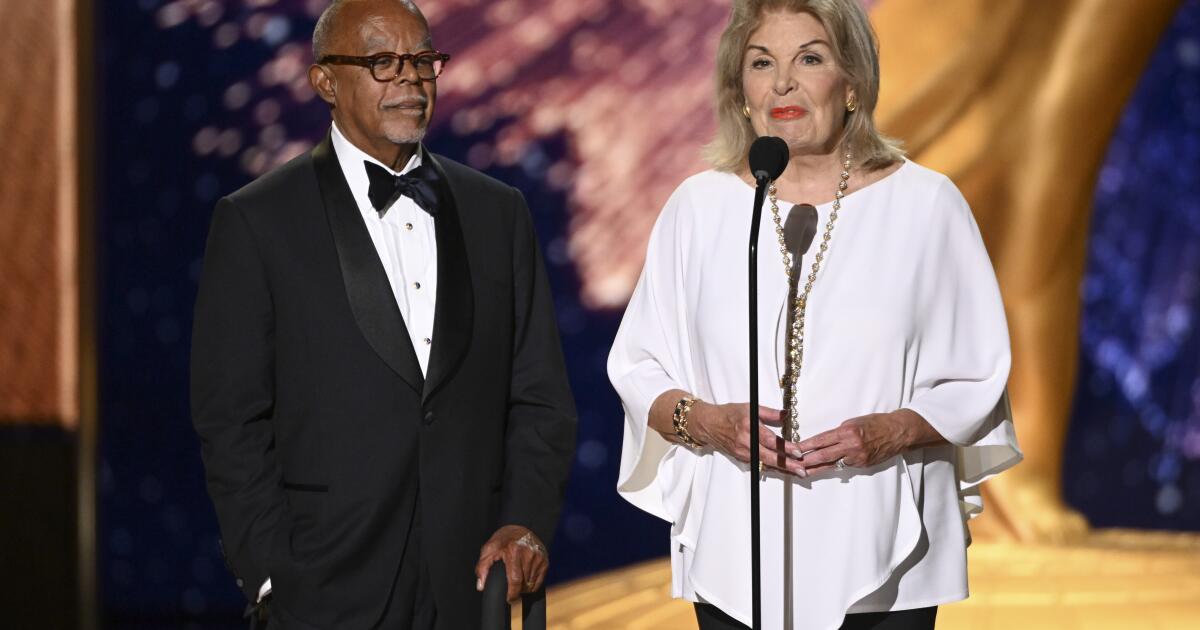As the recently defunded Corp. for Public Broadcasting phases out operations, the media nonprofit received a final toast from the Television Academy.
At last week’s Creative Arts Emmy Awards ceremony, the academy recognized the CPB as the recipient of the 2025 Governors Award, which “honors an individual, company or organization that has made a profound, transformational and long-lasting contribution to the arts and/or science of television.” Honorees in recent years have included “Dawson’s Creek” writer-producer Greg Berlanti and LGBTQ+ advocacy organization GLAAD.
The recognition comes just months after the Trump administration pulled more than $1 billion in government funding from the CPB, leading the organization to shut down for good.
The award was presented by historian and Harvard professor Henry Louis Gates Jr., the host of “Finding Your Roots,” which airs on PBS. He began the presentation with an explanation of how the CPB was conceived “as a means for the federal government to wield the power of television for the enrichment of all Americans.”
“Even with such a seemingly irreproachable mission, this corporation has come under fire many times, facing it’s first existential threat a mere two years after its inception in 1969,” he said. “And yet, it survived with its full funding with a great intercessor who appealed directly to Congress — an appeal predicated on endowing the nation’s children with what he called a meaningful expression of care. That great intercessor was none other than Fred Rogers. A man as you well know of impeccable character and the spiritual embodiment of the Public Broadcasting Service. Where have you gone Fred Rogers when we needed you most?
“Taking things for granted is human,” he continued. When something so essential to our American life has always been there, it’s natural to assume that it is always will be there. However, despair is not the final throes of this institution. Even an act of congress cannot erase the indelible legacy gifted to us by the charter of CPB.”
CPB President and Chief Executive Patricia Harrison, who accepted the award on the organization’s behalf, said the organization was a steward of federal funds that helped public television stations meet the changing information needs of the communities they serve, providing access to commercial-free high quality content.
“We funded programs telling America’s ever-changing story, inspiring curiosity, a love of learning and really we affirmed Mr. Fred Rogers philosophy,” she said. “It was pretty profound for kids, but really when he asked that question “Won’t you be my neighbor?” you have to think twice about it, right? And if the answer is yes, you have a strong democracy and a good country.
“We gave them [children] the education programming they need to succeed in school,” she added. “We provided teens a trusted space to seek the facts at a time when misinformation overwhelmed their social media feeds. This is safe place where they can learn and develop a love of learning. We made it possible for all of us, regardless of income or geography or background, to really have access to stories that inspire our best selves since somewhere in there, there is a best self, and remind us of what we share in common.”
Created in 1967 under the Public Broadcasting Act, the CPB has for nearly six decades supported culture-defining television programs including Emmy-winning series like “Sesame Street” and “Finding Your Roots.” The nonprofit has funded more than 1,500 locally owned media outlets, including 158 television grantees representing 365 public TV stations.
“For more than half a century, CPB has been a steadfast champion of storytelling that informs, educates and unites us and ensures public media remains a vital space where diverse voices are heard and communities are served,” said Television Academy Chair Cris Abrego in a statement last week.
“With this award, we honor CPB’s enduring legacy and its extraordinary impact on the cultural and civic life of our nation,” Abrego said.
In July, Congress passed and President Trump signed into law the Rescissions Act of 2025, which revoked more than $9 billion in government funds from the CPB along with several other federal entities and independent agencies. Trump issued an executive order in May prohibiting the organization from subsidizing NPR and PBS, claiming the media entities failed to present “a fair, accurate, or unbiased portrayal of current events to taxpaying citizens.”
In response, NPR along with three of its member stations filed a 1st Amendment lawsuit against the Trump administration. The case has yet to be resolved.
The CPB said in August that it will terminate most staff positions by the end of September, with business operations set to be phased out completely by January 2026.
Times Staff Writers Meg James and Stephen Battaglio contributed to this report.
